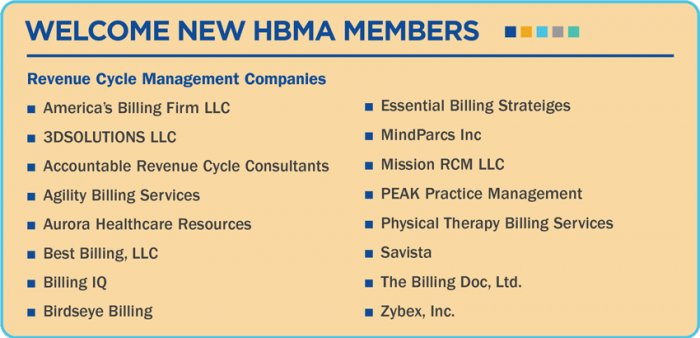In November 1992, HBMA held its organizational meeting in Chicago, which led to our incorporation in 1993. At the time, the billing industry, as we know it today, was about ten years old, and was propelled by the enactment of the Tax Equity and Fiscal Responsibility Act (TEFRA) in 1982. TEFRA mandated that hospital-based physician specialties bill separately (on a fee-for-service basis) rather than being included in the hospital’s bill. This legislative change, along with other federal laws, spurred explosive growth in the medical billing field and continues to have a significant impact on our industry.
Soon after our founding, a key group of charter members who understood the magnitude of the influence that the Health Care Financing Administration (HCFA) had over our industry, recognized the importance of a more organized and official representation of our association. HCFA, renamed the Centers for Medicare and Medicaid Services (CMS) in 2001, played a critical role in shaping the industry. By 1995, the board recognized the need for professional advocacy and established the Government Relations Committee (GR). Bob Burleigh, Vic Glorioso, Barry Reiter, Brian Effron, and other members began assembling a committee of experts in Medicare, other government healthcare agencies, enforcement agencies, and Congressional regulations affecting the billing industry.
The magnitude and pace of new rules, regulations, policies, and laws that were rapidly implemented between 1996 and 1998 were significant, and often overwhelming for many of our members.
A snapshot of these updates is listed below:
- In 1996, HIPAA was enacted. This legislation posed potential new challenges for our members and clients, even though it took years for the three components of HIPAA to be implemented. The GR Committee played an important role in advising HCFA on these rules and regulations.
- Since 1996, various HBMA leaders have testified before Congressional committees, subcommittees, work groups and task forces. In addition to creating many advocacy opportunities for our members, GR created visual diagrams of the life cycle of a claim to educate CMS on the complexities of this work. CMS sent representatives to a member billing company in Baltimore so they could observe the billing process in person.
- In 1997, the so-called Sustainable Growth Rate (SGR) methodology for calculating the annual physician payment formula was born. From 1997 until SGR was replaced by the Medicare Access and CHIP Reauthorization Act (MACRA) in 2015, HBMA contributed significant input and commentary on the government’s annual proposed rulemaking. The birth of the Merit Based Incentive Payment System (MIPS) and Alternative Payment Models (APM) may have created new bonus incentives for physicians and other providers, but they also created significant pain points and penalties. Unfortunately, the current physician payment system has problems which were not resolved by the retirement of SGR.
- In 1998, the Office of Inspector General (OIG) published the Compliance Guidance for Third-Party Billing Companies, a direct result of collaboration with HBMA’s Ethics and Compliance and GR Committees. Due to HBMA’s growing recognition and credibility at the federal level, a key group of members participated in refining the draft guidance, successfully achieving a significant change. As a result, billing companies were not required to report client wrongdoing to the OIG.
- In 1999, HBMA recognized the need for professional advocacy in Washington and Baltimore, which led to our relationship with Capitol Associates – 25 years ago! For over two decades, Bill Finerfrock of Capitol Associates effectively represented HBMA, opening myriad doors for our GR to advocate for our members. That responsibility was passed on to Matt Reiter and his team, who continue to build HBMA’s reputation on Capitol Hill and at CMS as an expert partner with depth and breadth of firsthand, real-time knowledge.
- In 2000, Leslie Aronovitz, Associate Director for Health Financing & Public Health Issues in the Health Education and Human Services Division, spoke at HBMA’s fall meeting. Her responsibilities were part of the General Accounting Office’s initiatives related to Medicare (GAO – renamed Government Accountability Office.) Her willingness to speak at our conference grew from the relationship HBMA had built with her and her office. Ms. Aronovitz asked GR representative Bob Burleigh and HBMA to nominate billing companies in four states to participate in evaluating the performance (or lack thereof) of Medicare contractors.
- In 2010, HBMA members from GR and Compliance Committees were invited to work with CMS, OIG, commercial payors, AHIMA, MGMA, RBMA, EDPMA, and other organizations on the risks and considerations in EHR Meaningful Use implementation. Unfortunately, CMS mostly discounted the recommendations. Additionally, HBMA’s GR, supported by several of our vendors and member companies, participated in the CMS ICD-10-CM implementation group before the go live date in 2015. Convincing CMS that testing prior to implementation was critical proved to be quite challenging.
For almost 20 years, GR has met annually with key CMS department directors in Baltimore to discuss issues, address challenges, share expertise, and build long lasting relationships. Some of those people now come to HBMA and/or GR with questions, knowing that we can and will help them. They have also been very gracious in helping HBMA with issues and questions when needed. Plans for the 2024 meetings are already under way at the time of this article. In conjunction with that day of meetings, GR also meets with various congressional committees which oversee healthcare regulations. We continue to successfully build relationships and are recognized as experts in all things related to physician and non-hospital revenue cycle management (RCM).
Of note, for many years, GR has requested meetings with the Medicare Advantage plan directors and managers. Unfortunately, our requests have been unsuccessful. Therefore, we are now escalating our concerns to CMS and the appropriate congressional committees.
GR and Capitol Associates keep our members informed and educated through current updates and education, and various member publications, including Capitol Insights Newsletter, Washington Report, webinars, emails, and special notices. Matt Reiter authors an article in every issue of RCM Advisor. Ad hoc notices are also issued, such as updates on the Change Healthcare hack. GR letters to and from congressional committees can be found on the Government Affairs section of the HBMA website.
The GR Committee conducts an annual deep analysis of the proposed Medicare Physician Fee Schedule (MPFS) to identify and comment on items or issues HBMA wants to address. In addition, Capitol Associates publishes a detailed document outlining the issues we believe are most important to our members. That work is currently underway for the 2025 proposed rule.
2024 has been a year of significant GR changes that will set the stage for many more years of success for HBMA. Although GR has a core of long-time seasoned veterans, Jackie Willett, Sherri Dumford, Rick Kleehammer, Holly Louie, and Sara Nofziger-Drew, it was time for growth and diversification. We welcomed Brandi Brooks as a recent member, and this year added four additional GR Committee members: Andrea Halpern Bryan, Robyn Johns, William Bloom, and Bonnie Flom. Our GR members are from Georgia, Minnesota, Utah, Oregon, Idaho, Oklahoma, Texas, Illinois, and New York, bringing with them a diverse range of expertise, including multi-specialty, office-based, hospital/provider-based, and other non-physician specialties. GR membership includes very large and medium-sized companies, with many members actively participating in other specialty organizations, creating new collaborative opportunities for HBMA.
In addition to our work on the MPFS, current efforts include meetings and communications with congressional offices which are focused on several key issues:
- Closing legal loopholes: We are working to end electronic funds transfer (EFT) fees and virtual credit card (VCC) fees.
- We have held several meetings with congressional offices specific to HBMA recommendations regarding the Change Healthcare cyberattack. Key concerns include the need for reimbursement for RCM companies for all the related expenses, provision of accurate RCM data on the ongoing disruptions, and a mandatory extension of timely filing for claims submission, appeals, IDR, etc. Additional meetings are anticipated as Congress explores ways to prevent any future recurrence. GR has also recommended that enforcement of the OCR-required risk assessments and independent audits of clearinghouses and other high-risk business models as an initial step before issuing more legislation.
- GR has prepared a letter strongly opposing the waiving of all medical debt by placing the blame, where it belongs, on the health plans.
- One significant issue to some members is CMS’ billing guidance on split/shared visits. In the 2024 final rule, CMS surprised everyone by changing course and approving the AMA CPT® instructions rather than the planned time-based only criteria. Initially, it was unclear whether this change would apply to future years and the 2025 proposed rule did not offer further clarification. However, GR recently received a response from CMS confirming that the 2024 final rule will also apply to 2025 split/shared visits.
- Noridian in California created mass confusion during a webinar stating that on-campus, provider-based outpatient hospital clinics (place of service 22) could not bill split/shared visits. GR immediately reached out to the CMS MAC Oversight Committee for assistance, as Noridian’s position directly conflicts with the Federal Register, CMS manuals, and the physician fee schedule. Despite being notified of the dispute by the MAC oversight group, Noridian “clarified” their position by stating that billing should be based on whether the visit is brief or long – criteria that do not exist in any CMS publication. Additionally, it is evident that Noridian incorrectly equates “outpatient” with “observation only,” which involves a completely different set of CPT® codes and rules than those for outpatient office visits. We are currently awaiting a response from CMS.
Over the years, the GR Committee has been instrumental in influencing numerous regulatory and legislative changes that affect HBMA members and their clients. Equally important, if not more so, are the adverse changes that have been prevented, minimized, or modified, providing additionally significant and meaningful benefits to medical billing companies.
In summary, the GR Committee and Capitol Associates have consistently been a busy and vigilant team, continually monitoring federal issues that affect our members and clients. They actively seek opportunities with CMS, congressional committees, and other organizations to advocate for HBMA members and our clients. Our success lies in the deep and broad expertise in RCM, our strong relationships with provider clients, and our ability to have meaningful conversations with CMS and congressional committees on behalf of the medical billing industry.


